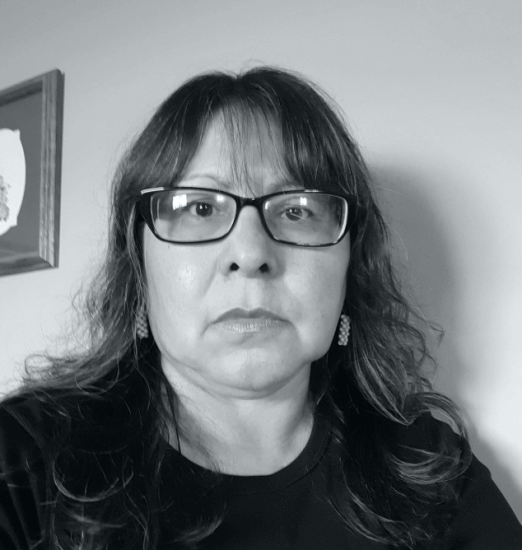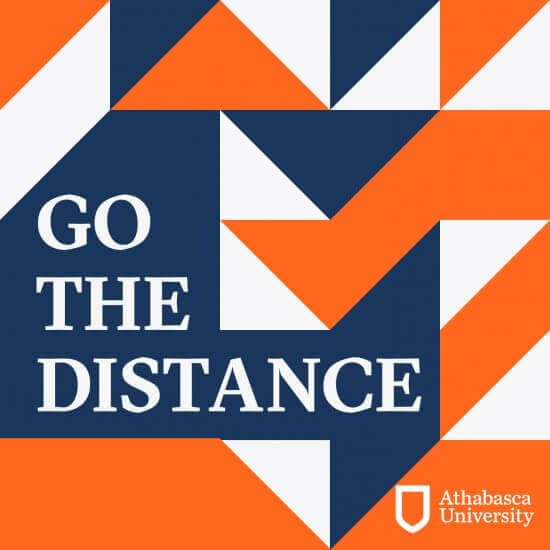Going back to school later in life can be daunting, even before you factor in an artificial intelligence-powered virtual co-op, ADMN 405. But for Laverne Wells, taking on the challenge of getting a degree and navigating an innovative new course has all been worth it.

Laverne Wells (Bachelor of Management '21) was in her 50s when she decided to get a bachelor's degree. She had wanted to go back to school for a while, but life got in the way. She finally took the leap, planning to gain some knowledge to start her own business and give back to her community.
Yet some of the biggest lessons she learned were not from real people. She was part of the first batch of students to take part in a cutting-edge business co-op run through artificial intelligence.
Wells is from the Blood Tribe First Nation near Lethbridge, Alta. In the late '90s. She went to Lethbridge Community College, unsure what she wanted to study.
"I didn't really know what I wanted to," Wells explained, "so I kind of took like general studies. And then I found an interest in business. And that's when I pursued the business degree program. I saw more opportunities in that area. Or it could be an entrepreneur or I can do this or do that."
Addressing a First Nations housing crisis
So Wells graduated with a diploma in business administration. She got a job in the Blood Tribe Department of Health, where she worked for 4 years before moving over to their housing department, where she spent the next 8 years.
"I really enjoyed my job. You know, I loved working at housing, even though it's stressful. And you know, I was told you know, if I could survive working at housing, I can survive."
Wells had to keep a lot of people happy. And she had lots of responsibilities, conducting home visits, answering client inquiries, selecting for new housing, or for minor repairs. "There's so many different programs that housing has to offer."
It wasn't easy. And she was seeing firsthand symptoms of the housing crisis on reserve, like deteriorating homes and overcrowding.
"There's a lot of factors. It's not just one thing, why we have these crisis," she says.
But despite the difficulties, she says the job was satisfying, "Because you're dealing with people's lives on a daily basis. You know, this is their home, their sanctuary. We all want to come, live in a nice, comfortable, home. So I enjoyed it.
"You know, I thought I knew a lot of people from the reserve. I was surprised, you know, I met people that I didn't even knew exist on my own reserve."
I thought I knew a lot of people from the reserve. I was surprised, you know, I met people that I didn't even knew exist on my own reserve.
Laverne Wells (Bachelor of Management '21)
After that, she got a contract at a neighbouring reserve setting up the rental system. That meant drafting up new policies and procedures. When that contract was up, she decided it was time to get her degree. It was something she'd always wanted to do. But she was a single mom supporting her family.
Going back to school in her 50s
"I lost my husband and back in 2003," Wells explained, "so I had struggled to raise my family like single handedly. And I've always wanted to go back to school, but I couldn't because I was raising my kids.
"So when they graduated from high school, then I took that opportunity later on. That's when I decided now's the opportunity for me to go back to school because I wanted always wanted to get my degree. So here I am."
Wells wanted to start a business, though she wasn't sure exactly what it would be. So she enrolled in a Bachelor of Management at AU to help develop this skill she needed.
Finding her place
She was self conscious about going back to school at her age. Those feelings came out when she took a couple of electives in person.
"I don't know, I just kind of felt out of place. I know it sounds stupid, but me being an older person and I thought, oh my god, you know, like, what are these people gonna think like, you should be done school."
So Wells enjoyed the online aspect. She could connect with her peers remotely. And it worked for her for other reasons, "Because I'm constantly helping out my kids with my grandkids. So there's a lot of flexibility there. And you know, if I wanted to work, I could go back to work."
Now, university is always going to be full of new experiences. But for Wells, something completely unprecedented was waiting. She was going to participate in a new business co-op, ADMN 405, run through artificial intelligence.
"First I thought, wow, you know, kind of felt intimidated. I even thought of withdrawing but I thought, 'No, I'll just stick it out and see what happens.' And I'm glad I did. Because that course was different from all the other courses that I've ever taken during my post-secondary learning."
First of its kind virtual co-op
The class is the first of its kind. Academic coordinator Richard Dixon teaches it. He says the idea came about when Dr. Deborah Hearst, at the time dean of the Faculty of Business, was at a conference where she saw a presentation about the possibilities of AI in education.
"We just had a report from our business advisory committee saying that we needed to make our graduates much more work ready," Dixon recalls. "They had the hard skills, but really weren't functioning as well as they'd like to have some kind of experience. Deborah came back and put 2 and 2 together and said, 'You know what? Let's make a work-ready graduate by using the artificial intelligence virtual co-op."
So Hearst, Dixon and some others got to work developing it. They partnered with Ametros Learning, which uses IBM Watson's AI.
Artificial intelligence enhances learning
"We created an actual work experience that you would have, where you'd go and work in a co-op experience as part of any program, except we created a virtual reality world, called the 'money bank,' where the students now have to work through a set of circumstances, with characters, AI-power characters. It's an incredible experience, actually."
Those characters are the type of people you'd encounter in a real work situation, direct reports, bosses, and clients, all with their own personalities and challenges. They send emails, and they chat in real time.
"The advantage of this over regular bricks-and-mortar school is we can put in so many different kinds of experiences that you never get to work off," Dixon explains. "Again, you got an employee that doesn't want to do anything? Well, how do you motivate them? How do you talk to them? They have to do that."
Bots and bad bosses
They're all bots, of course, but it can feel very real.
"The boss is a total jerk," Dixon says, "and the AI is getting really good at this knows how to read what you're saying and then push your buttons. So what we're teaching the students is how do you manage with a difficult boss?"
The boss is a total jerk and the AI is getting really good and knows how to read what you're saying and then push your buttons. So what we're teaching the students is how do you manage with a difficult boss?
Richard Dixon, academic coordinator
Dixon says one student took it pretty personally. "One of the students finally got so frustrated and said, 'Well, if you don't want to go ahead with this project, I'm just going to go above your head.'"
That led to a good online discussion about why that is not a good idea in a bureaucratic environment; that behaviour can get you fired.
"Students learned things about emotional regulation, and not to respond to an email when you're angry. Walk away for a little bit, take your time and then respond."
Applying real-life skills
In other words, Dixon says, they're learning those people skills that you usually only get in the workplace. And Wells appreciated that.
"When you're going to school, they only teach you the theory aspect of any profession," she says. "They don't teach you like the real hands on and what's expected in real-life situations. That's why I really enjoyed it because I learned a lot about myself, you know, like, through the decision making and how to effectively communicate in an ethical manner with my peers."
You're never too young, you're never too old … if you have it in you to go to school, by all means, go back.
Laverne Wells
During her time at AU, Wells came up with a business plan that built on her past experience.
"I wanted to start a consulting business. I wanted to focus specifically on First Nation housing communities. I named it LW Consulting … I don't know, it could change. I'm not going to waste too much time on the name because I've still a lot of work to do.
Wells has some words of advice for other people thinking of going back to school later in life.
"What I've learned and what I've always believed, it doesn't matter how old you are. You're never too young, you're never too old … if you have it in you to go to school, by all means, go back. Because education is the key to success. I've always believed that and that's driven me."
Listen to more episodes
Listen to more episodes on The Hub or download from Apple Podcasts, Google Podcasts, Spotify, and more.
